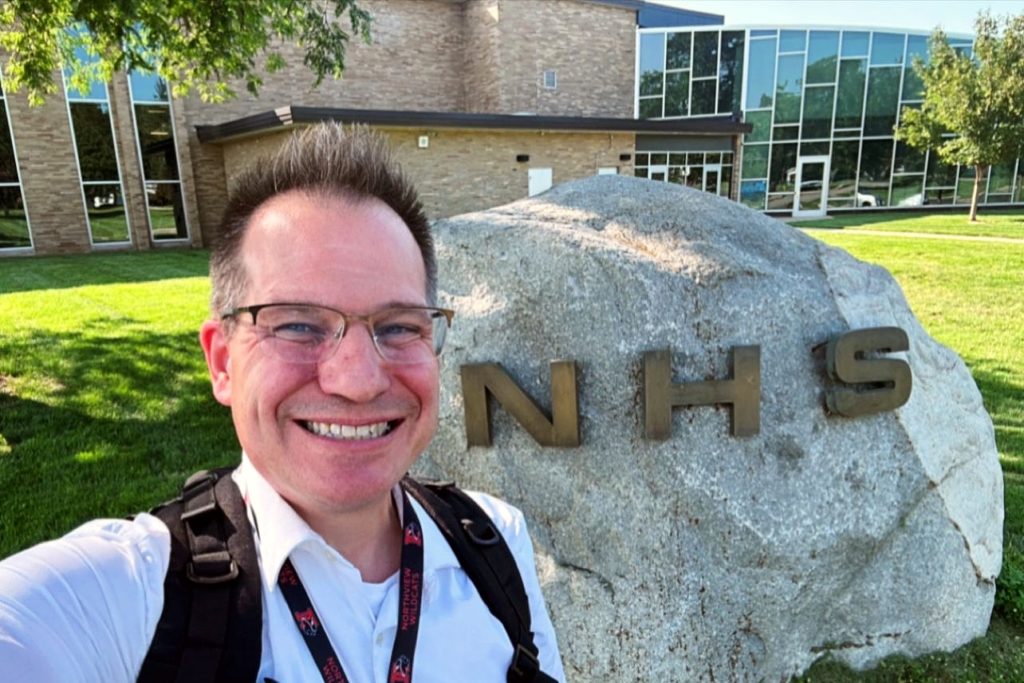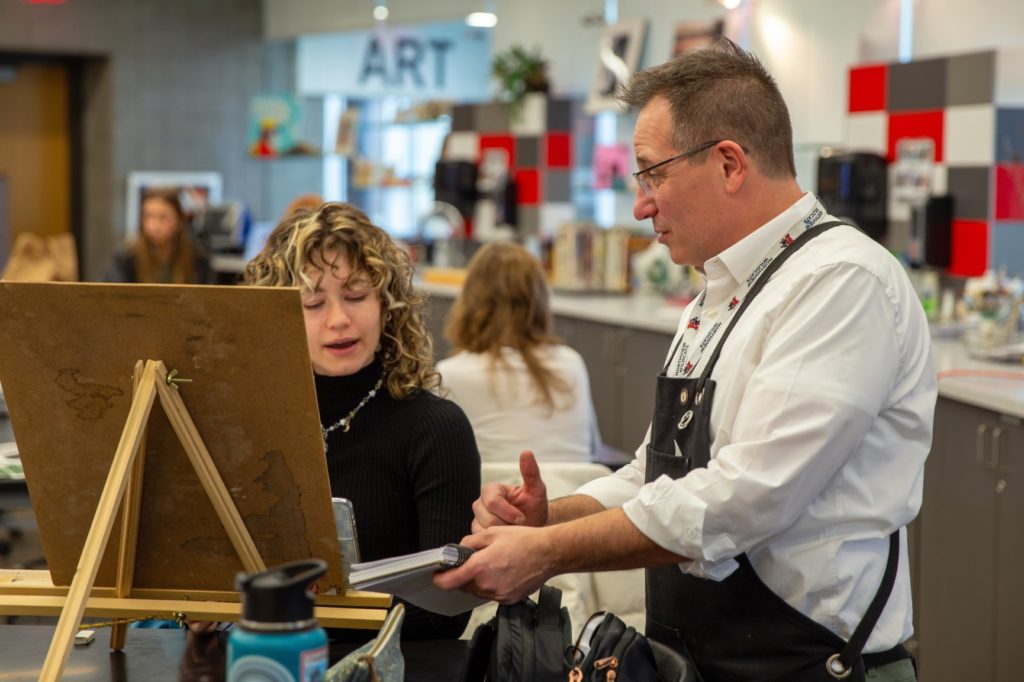Nathan Kukla, who graduated from Michigan State University with a BFA in Art Education and an M.A. in Teaching and Curriculum, recently was recognized at the national convention for the National Art Education Association as the Michigan Art Educator of the Year, an honor bestowed upon him by the Michigan Art Education Association in recognition of his outstanding 26-year career, which can be traced back to his time at MSU.
“It feels great, and it’s not something that just happened. I’ve been doing this for years,” Kukla said of the honor. “It’s recognition of the time and dedication that I put into my programs and into my students.”

Kukla began his teaching career at West Ottawa Public Schools in Holland, Michigan, where he taught art for 25 years, was Head of the Art Department for 10 of those years, and helped build an acclaimed arts program. In August 2023, he left West Ottawa Public Schools to begin teaching at Northview High School in Grand Rapids, another acclaimed program. Soon after, he learned he had been named the Michigan Art Educator of the Year.
Kukla’s career has been filled with many memorable moments like this, including watching students win awards or receiving national recognition from organizations like Scholastic and sitting in the audience as a student walks across the stage at Carnegie Hall. But it’s the quiet moments that he says he thinks of most fondly.
“Knowing that I helped launch people’s careers and helped them find what they’re supposed to do in life is important.”
“Students will reach out to me after years and just say, ‘This is what I’m doing. I’m using these skills that you taught me, and I just want to let you know that I appreciate what your class did.’ Knowing that I helped launch people’s careers and helped them find what they’re supposed to do in life is important,” Kukla said. “Sometimes it’s not even in art. But to know that they’re doing what they’re supposed to, that they’ve found the courage to become who they’re supposed to be, those are the important moments.”
Kukla’s own career search began at MSU when he came here for his undergraduate education in 1994. At the time, he knew he wanted to pursue an arts education but didn’t know what he wanted to do with that. However, he did know he was where he needed to be.
He quickly was accepted into the art program but reached a crossroads during his junior year when asked to choose an area of emphasis – sculpture, painting, or drawing – for the remainder of his undergraduate education.
“I wanted to do it all,” he said. “I just wanted to make art.”

His advisor told him that the only people who worked in every medium were art teachers. With that, Kukla decided to major in Art Education.
Later that same year, an interaction with a group of third graders confirmed that he had made the right choice. As this group of third graders examined different pieces of art in the Undergraduate Exhibition at Kresge Art Center Gallery, Kukla showed them the sculpture he created, which had a hidden piece inside that could only be found by opening the sculpture a certain way.
“They got really excited about that, and that got me excited. I realized that’s what I wanted to do. I want to get people excited about art, excited enough to make their own art,” Kukla said. “That’s where that passion for teaching came from. It goes back to that moment where those little kids got excited about making art. That’s what it always comes back to – getting students, young artists, excited about making art and getting their work into shows so they can get that recognition.”
“There also are those breakthrough moments where students put in the time and effort, learn the skills, and have that moment when they realize, ‘I can do this’… That’s amazing. That’s invigorating. That’s why I get up in the morning and come in.”
Kukla says that every day is a privilege to be able to walk into the art room and discover what his students have in store for him.
“If you give young artists the same prompt, you’re going to end up with 10,000 different answers. It’s never ever the same thing, and I find that really exciting,” he said. “There also are those breakthrough moments where students put in the time and effort, learn the skills, and have that moment when they realize, ‘I can do this.’ And they start to feel more competent about who they are as artists and as people. That’s amazing. That’s invigorating. That’s why I get up in the morning and come in.”
To help students reach these breakthrough moments, Kukla prioritizes creating a classroom dynamic that equips students with the skills to find their voice and perspective. Part of his process involves asking open-ended questions and listening to the answers – not just verbally but listening to what a student is making or trying to make.

“Taking the time to sit down and have an actual conversation with somebody and listening, really listening, to what they’re saying, helps me pick up on what sparks their interest and what they get excited about,” he said. “Finding what they are passionate about and encouraging them to follow that. That’s what it comes down to.”
Kukla’s teaching style also emphasizes the cultivation of resilience and creativity. He believes that the importance of art classes is not just in giving students a place to make things; they are essential to nurturing a creative mindset and developing values of perseverance and risk-taking. He focuses on the idea that mistakes are not setbacks but steppingstones to growth. His art room is an environment where students feel safe to explore, experiment, and stumble.
“Try something you’ve never done before. It might not work, and that’s okay,” he tells his students. “If you learn what didn’t work, that helps you find the right answer. You only fail when you stop trying.”

Also central to Kukla’s philosophy is the belief that creativity is an indispensable asset in an era marked by an increasing reliance on technology.
“Trying to teach creativity, or teaching people how to think creatively, is an important skill to have,” Kukla said. “AI can generate the right answer, but it’s always going to be the same answer. Trying to come up with something new takes creativity. Every profession needs people who can think creatively.”
Kukla also emphasizes the significance of nurturing creativity from a young age. He advocates for a holistic approach to education that encourages exploration of creativity across disciplines and ages, from sculpting in the art room to coding in the computer lab, from kindergarten to college.
“AI can generate the right answer, but it’s always going to be the same answer. Trying to come up with something new takes creativity. Every profession needs people who can think creatively.”
“Little kids want to create. You give them any material and they’ll start making stuff. They’ll use their imaginations, and they’ll play around. Even if it doesn’t work out, they’ll enjoy the learning process,” Kukla said. “That’ the kind of energy that we need to tap into and foster throughout people’s entire education. We need to support it in elementary schools with funding for the arts, but we also need to encourage it through high school and into college. People need to learn how to be creative and to know it’s okay to play and make mistakes. When you play, sometimes you win and sometimes you lose, which means sometimes you make mistakes, but you learn from those, and you try again. It’s that joy of trying to figure it out that we need to tap into and really encourage in education and in society.”
A willingness to make mistakes and an openness to new ideas and opportunities are two factors that have been most helpful to Kukla’s career and are key pieces of advice he offers to students.
“You have to be a lifelong learner,” he said. “I’m still trying to figure out what I want to be when I grow up. I started teaching elementary art, and then I was open to moving up to secondary, then I took on other roles. Be open to opportunities that present themselves and make sure they fit your life.”
Aside from teaching, Kukla has been an advocate of the arts. For 20 years, he worked with the National Arts Honors Society at West Ottawa High School and for eight years served as a member and regional liaison for the Michigan Art Education Association, which advises K-12 curriculum for the state.
As he looks back on his career, Kukla is grateful for his mentors and teachers. He was raised in a family of educators, including his mother, uncles, and father-in-law, and recognizes the pivotal role his relatives, mentors, and teachers have played.
“Education is very important in my life, and I have a lot of pride in being a Spartan. I earned my masters from the number one educational program in the country,” he said. “And I’ve had teachers not only in the classroom or in formal settings, but mentors who have encouraged and kept in touch and that’s been crucial to my development, not only as a teacher, but also as a person. Those coaches, those friends who support you and recognize what you’re doing has been invaluable for me and it started at MSU with my professors Charlie Steel and Laura Cloud, people who recognized and encouraged me as a young student, and I truly appreciate and am grateful to them.”
Kukla was presented with the 2023-2024 Michigan Art Educator of the Year Award at the annual Michigan Art Education Association Conference in October 2023. He then was recognized as being the Michigan Art Educator of the Year at the National Art Education Association National Convention in April 2024.






